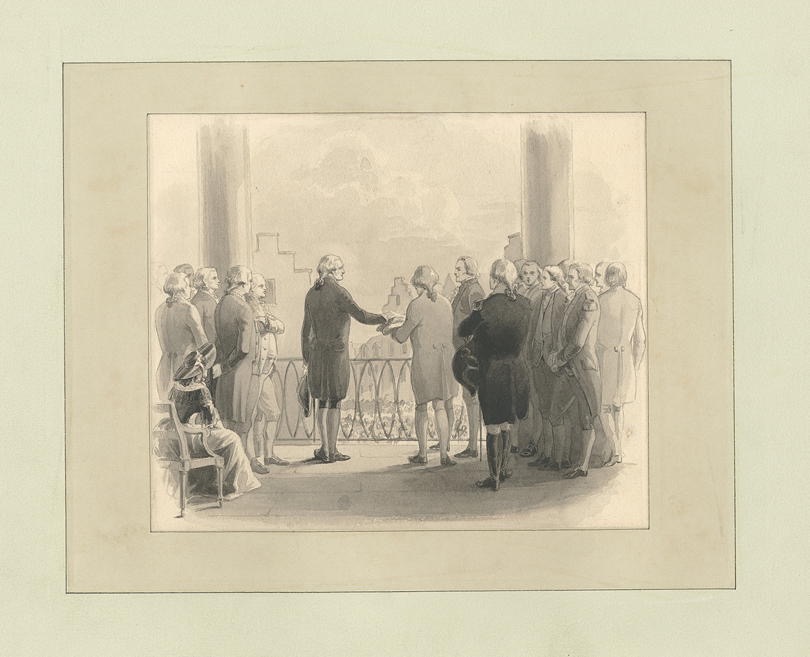PublicService

Unknown: Washington swearing the oath of office (nineteenth century)
" … the only thing standing between any of us and absolute tyranny."
The Muse returned from Port Commissioner Training with new information. She'd won the election with less than a complete understanding of what she was running for then. The office had a rough job description, but then job descriptions, by long tradition, barely scratch the surface of describing actual responsibilities. Historical precedent tends to expand or contract the delineated scope, and simple preference can profoundly influence what such jobs entail. She could become an activist or a pacifist, depending. The training presented legal boundaries and explained implications. The notion that candidates cannot be required to satisfy certain conditions proved to be among the more surprising revelations.
Candidates have always been required to meet two broad conditions: that they are a citizen of a certain age of the municipality within which they intend to serve and that they swear to uphold the constitution of that same place. These two conditions become binding with an oath, freely given, that the incumbent will "to the best of their ability" fulfill the role to which they've been elected. In this state, no candidate can be required to hold a degree, for instance, or some specific professional certification. No requirement can be demanded that someone running for Sherrif must have graduated from studies in law enforcement. (This fact might serve as a powerful argument against electing sheriffs.) Legislators cannot likewise be required to hold a law degree, even though their primary responsibility in office will be to craft and negotiate laws. Lord knows we've seen the effect of allowing just anyone to run for President!
On reflection, I can imagine no better way to filter our candidates. We have a bureaucracy comprised of professionals of every stripe and holding every possible degree. Their elected administrators need not necessarily hold such degrees to serve as sufficient overseers, though the increasing complexity of government service might one day argue differently. We will never select our airline pilots by Oath of Office because we require more than just the promise of fulfilling their role "to the best of their ability." This seems like a somewhat backhanded, self-defining commitment. However one performs might reasonably be argued to have been representative of the best of their ability. Clearly a lousy administrator, Trump served to the likely very best of his meager ability, thereby sadly fulfilling even his sorry oath of office.
The oath reinforces the notion that self-governance, the sort our founders aspired to create, does, indeed, demand people of good faith to accomplish it. A single scoundrel might not bring down the castle, but they will probably threaten some battlements. The thing about democracy might be that it abhors conditions. The more specific the specifications, the less latitude for action, and self-governance demands considerable latitude for action. We are, by acclimation, making up our governance as we go along so that we dare not insist upon too few degrees of freedom, even when this stretches our ability to tolerate it. The alternatives would be worse for us. If we decided that we needed to be exclusively ruled by MBAs, imagine how that might permanently ruin everyone's day. Or, if only JDs need apply for Congress, we might forfeit a certain foundational horse sense in that process. Doubtless, we might also vanquish a fair amount of horse shit in the process, too, but big D Democracy was always practiced ankle-deep in horse shit, anyway.
The clean and tidy need not apply. We are practicing governance not ever to achieve perfection but apparently to become more adept at tolerating our own imperfections. We should properly never expect to become fully satisfied. Our system relies upon a certain bright-eyed naivety for it to work. Get too clever, and it starts to fail. Stay too stupid, and it also fails. We flail toward our successes, which might necessarily always end up being limited. If you're not disappointed, you're not paying close enough attention. If you've become cynical, turn off the media until some sanguine sense returns. Our governance seems altogether too serious to leave to certified professionals. It rightfully belongs in the hands of citizens still innocent enough to believe in and agree to publicly take an oath in front of God and everybody. "To the best of my ability" might be the only thing standing between any of us and absolute tyranny.
©2023 by David A. Schmaltz - all rights reserved


